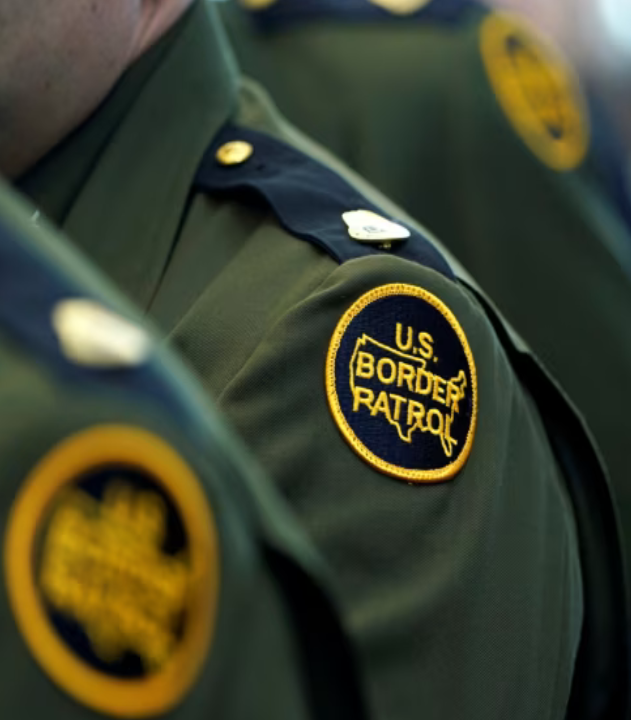
Lucas Sielaff was in a car queue waiting to cross from Mexico into the US when a border guard, seeing his German passport, began bombarding him with questions.
The 25-year-old tourist, who had been travelling with his American fiancée, was shackled, taken in for questioning, and then interrogated for hours. He spent 16 days in detention before being escorted to the airport and allowed to fly back to Germany earlier this month.
“I still have nightmares [about the experience] and I’m not yet back to normal,” Sielaff told the Financial Times. “I’m trying to process everything properly. It’ll take a while.”
Sielaff, who had a valid visa waiver entry permit and had visited the US several times previously, is one of a string of high-profile cases of European and Canadian tourists to have suffered hostile treatment at the hands of border guards since Donald Trump’s return to the White House.
Others have included Becky Burke, a Welsh backpacker who was detained for 19 days. Her parents complained she was taken to the airport for deportation “in leg chains, waist chains and handcuffs” after being accused of travelling on the wrong visa. “She’s not Hannibal Lecter,” her father Paul Burke told the BBC.
Canadian actress Jasmine Mooney said she felt like she had been kidnapped and forced to take part in “some sort of insane . . . psychological, social experiment”. She spent 12 days in detention after trying to renew an expired work visa at a border.
The apparent shift has prompted several nations to change their travel advice and triggered a frenzy of questions in online travel forums about whether it is safe to go to the US.
“Every day I’m getting calls from citizens, visa holders, immigrants and travellers,” said David Leopold, chair of the immigration practice group at UB Greensfelder. “There’s huge concern out there . . . The administration is creating an atmosphere that is very restrictive to immigrants and even visitors and tourists.”
The publicised cases of detentions and deportations are part of a pattern of “more aggressive enforcement” at the border since the start of Trump’s second presidency in January, according to Noor Zafar, a staff attorney at the American Civil Liberties Union.
Immigration lawyers said that, while some nationalities have long been subject to enhanced scrutiny, any non-citizen arriving into the US should now expect more questioning than they were previously accustomed to.
No rules have officially changed for most visitors, said Ted Chiappari, head of the immigration law group at Duane Morris. But he warned that border officers’ discretion was “being applied differently”.
In some of the recent cases that have made the headlines, there appears to have been at least some legitimate grounds for the US authorities to act.
Sielaff, the German tourist, believes his ordeal may have stemmed from a misunderstanding caused by language issues. He said he had incorrectly said he lived in Las Vegas, rather than staying there temporarily, leading the border guard to believe he was residing in the country illegally.
US Immigration and Customs Enforcement did not respond to a request for comment.
In some instances US authorities have been accused of acting with more sinister motives. The French government last week claimed an academic who was travelling to a conference in Houston was denied entry to the US for expressing critical views about Trump in messages to friends and colleagues on his mobile phone.
The US interior department rejected that suggestion, claiming instead the academic had violated a non-disclosure agreement by possessing confidential information from the Los Alamos National Laboratory, which conducts sensitive scientific research.
Multiple countries have responded to the shift by updating their travel advisories. The UK noted US border authorities “set and enforce entry rules strictly” and warned travellers “may be liable to arrest or detention if [they] break the rules”.
Some European countries also issued specific warnings for transgender tourists amid concerns that Trump’s executive order requiring federal agencies to only recognise two sexes — male and female — could cause problems with their travel documents.
Germany and Denmark specifically advised travellers whose gender on their passport does not match that assigned at birth, or who use the gender marker “X”, to contact their local US embassy ahead of travel.
This uptick in such warnings could damage the US tourism and hospitality sector, which accounted for about 11 per cent of US jobs and contributed $2.36tn to the economy last year, according to the World Travel and Tourism Council.
“Travellers are already in a stressful situation and they don’t want anything to make that journey tougher,” said Marta Soligo, an expert on the tourism industry at the University of Nevada, Las Vegas. “People are seriously questioning whether they should travel to the US, and that’s a huge concern for the industry.”
Roland Lescure, a French member of parliament who represents French citizens living in North America, said some expats were also reconsidering their decision to live across the Atlantic. He conducted a recent survey that found about 19 per cent were having doubts.









